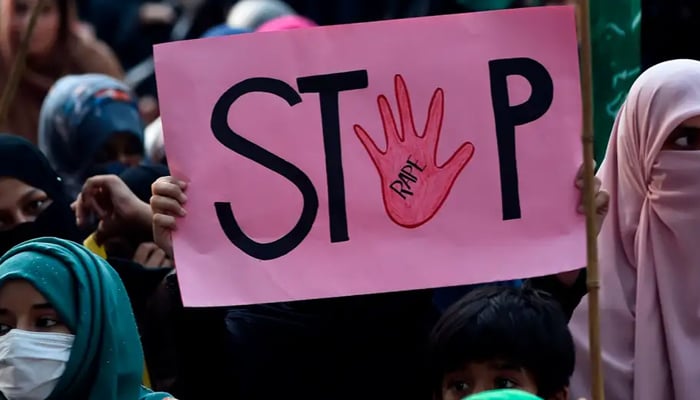Failing our women
These shocking numbers should rattle every official, every politician and anyone who is in a position of power
According to the police surgeon in Karachi, more than 500 women and underage girls were sexually assaulted in the metropolitan city in 2023 while there were 4,042 cases of physical assault on them. These shocking numbers should rattle every official, every politician and anyone who is in a position of power. Unfortunately, we will only see lip-service paid to how much women’s rights and child rights matter to them while the number of these cases continue to pile up in the new year. The reason Pakistan ranks 142 out of 146 countries in the World Economic Forum’s Global Gender Gap Report 2023 is because of four key benchmarks - one of which is ‘health and survival’. When women and underage girls are sexually assaulted and physically assaulted in every part of the country, when a young girl is allegedly murdered by her own family in Kohistan on the orders of a local jirga because of a fake viral video and photographs, then we should not be surprised if we rank the lowest of the low in global rankings when it comes to gender parity and women empowerment. In its half-yearly report published last year, Islamabad-based NGO Sahil said that an average of 12 children per day were subjected to sexual abuse in Pakistan, and a total of 2,227 cases of child sexual abuse were reported between January and June 2023.
Every political party and those in positions of power use women’s rights as an convenient talking point but are suspiciously silent when it comes to the numbers of rape cases, assault, sexual harassment, underage marriages, forced conversions of women belonging to relligious and other minority groups. In a country where women are killed in the name of ‘honour’, where women’s lives are put in danger through false campaigns just because they dare to march for their rights, where acid is thrown on women just because they dare to say no, and where women are neither safe in their own homes nor outside, then the ruling elite should admit its complicity and its failure in protecting the country’s women from crime. Even as we write this, Baloch women are out on the cold streets in Islamabad, asking for the return of their loved ones who have been missing for decades. And what has the state’s first response been? To arrest them and then gaslight them. This is the reality of the ruling elite of Pakistan. Women have come a long way through their own struggle in Pakistan but it is in no part thanks to the state and the power elite.
What Pakistan needs to do is to go beyond the legal domain and address the underlying social and cultural factors that perpetuate gender-based violence. This includes challenging harmful gender norms and stereotypes, promoting gender equality and women’s rights, and providing comprehensive education to both girls and boys regarding violence and patriarchy. By promoting a culture of equality and consent, we can create a society where women and girls can live free from the fear of sexual violence.
-
 Milo Ventimiglia Calls Fatherhood 'pretty Wild Experience' As He Expects Second Baby With Wife Jarah Mariano
Milo Ventimiglia Calls Fatherhood 'pretty Wild Experience' As He Expects Second Baby With Wife Jarah Mariano -
 Chinese Scientists Unveil Advanced AI Model To Support Deep-space Exploration
Chinese Scientists Unveil Advanced AI Model To Support Deep-space Exploration -
 Anthropic’s New AI Tool Wipes Billions Off Cybersecurity Stocks
Anthropic’s New AI Tool Wipes Billions Off Cybersecurity Stocks -
 Trump Announces He Is Sending A Hospital Ship To Greenland Amid Rising Diplomatic Tensions
Trump Announces He Is Sending A Hospital Ship To Greenland Amid Rising Diplomatic Tensions -
 'Never Have I Ever' Star Maitreyi Ramakrishnan Lifts The Lid On How She Avoids Drama At Coffee Shops Due To Her Name
'Never Have I Ever' Star Maitreyi Ramakrishnan Lifts The Lid On How She Avoids Drama At Coffee Shops Due To Her Name -
 Inside Prince William’s Plans For Prince Harry: What Will Happen To Duke Once He’s King
Inside Prince William’s Plans For Prince Harry: What Will Happen To Duke Once He’s King -
 Chyler Leigh Pays Moving Homage To 'Grey’s Anatomy' Co-star Eric Dane: 'He Was Amazing'
Chyler Leigh Pays Moving Homage To 'Grey’s Anatomy' Co-star Eric Dane: 'He Was Amazing' -
 Did You Know Tech CEOs Limit Screen Time For Their Own Kids?
Did You Know Tech CEOs Limit Screen Time For Their Own Kids? -
 Matthew Lillard Admits Fashion Trends Are Not His 'forte'
Matthew Lillard Admits Fashion Trends Are Not His 'forte' -
 SpaceX Launches Another Batch Of Satellites From Cape Canaveral During Late-night Mission On Saturday
SpaceX Launches Another Batch Of Satellites From Cape Canaveral During Late-night Mission On Saturday -
 Princess Beatrice, Eugenie Get Pulled Into Parents’ Epstein Row: ‘At Least Stop Clinging!’
Princess Beatrice, Eugenie Get Pulled Into Parents’ Epstein Row: ‘At Least Stop Clinging!’ -
 Inside Kim Kardashian's Brain Aneurysm Diagnosis
Inside Kim Kardashian's Brain Aneurysm Diagnosis -
 Farmers Turn Down Millions As AI Data Centres Target Rural Land
Farmers Turn Down Millions As AI Data Centres Target Rural Land -
 Trump Announces A Rise In Global Tariffs To 15% In Response To Court Ruling, As Trade Tensions Intensify
Trump Announces A Rise In Global Tariffs To 15% In Response To Court Ruling, As Trade Tensions Intensify -
 Chappell Roan Explains Fame's Effect On Mental Health: 'I Might Quit'
Chappell Roan Explains Fame's Effect On Mental Health: 'I Might Quit' -
 AI Processes Medical Data Faster Than Human Teams, Research Finds
AI Processes Medical Data Faster Than Human Teams, Research Finds




